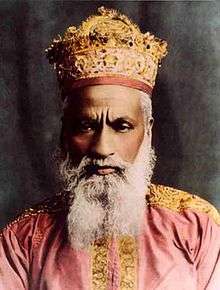Hazur Rai Saligram Bahadur
| Salig Ram | |
|---|---|
 | |
| Religion | Radhasoami Faith |
| Other names | Huzur Maharaj |
| Personal | |
| Born | 14 March 1829 |
| Died |
6 December 1898 Agra, North-Western Provinces, British India (present-day Uttar Pradesh, India) |
| Senior posting | |
| Based in | Agra, Uttar Pradesh, India |
| Period in office | 1878-1898 |
| Predecessor | Shiv Dayal Singh |
| Successor | Ajodhya Prasad, Brahm Shankar Misra, Shivbratlal |
Salig Ram, popularly known by the honorific "Huzur Maharaj" and by the government-conferred title "Rai Bahadur," was born in Peepal Mandi, Agra, on 14 March 1829. He served as chief inspector of post offices in British India, and, in 1881, was Postmaster-General of the North-Western Provinces, based in Allahabad. He was the first Indian to hold the position.
Salig Ram came in contact with his guru, Shiv Dayal Singh, in 1858 in Agra. Salig Ram recognised his guru as the first physical incarnation of the Supreme Being, whom Salig Ram called by the name "Radhasoami." Salig Ram served Shiv Dayal Singh for many years and, after Shiv Dayal Singh's death, Salig Ram retired from his job, established the Radhasoami Faith in Agra, and took up the role of guru. He died on 6 December 1898.
Successors
Salig Ram had three successors: his son Ajodhya Prasad who continued satsang at Salig Ram's home Huzuri Bhavan in Pipal Mandi; Brahm Shankar Misra who established the Central Administrative Council at Soami Bagh; and Shivbratlal in Mirzapur.
Books
Salig Ram published "abstracts" of the talks of Shiv Dayal Singh, as well as his own writings. He wrote following books:[1]
- Prem Patra Radhasoami (six volumes)
- Prem Bani Radhasoami
- Radhasoami Mat Prakash (English)
- Radhasoami Mat Sandesh
- Radhasoami Mat Upadesh
- Sar-Upadesh
- Nij-Upadesh
- Guru-Upadesh
- Jugat Prakash